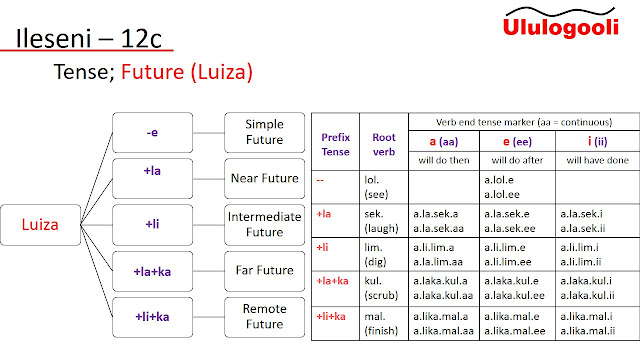Featured
- Get link
- X
- Other Apps
Lesson 12 : Tense in Lulogooli
Discussion
Tense in Lulogooli is known as “ing’iinga”. Plural, “zing’iinga”. "Ing'iinga" is noun for time.
The tense is only used for verbs, where the reader or the writer maks exact time of happening.
The exact time of happening of any activity gives reporting its legitimacy. That is why letters have dates and minutes have time of meeting. Time is regarded a most precious gift.
So is writing with clarity of time. Where one is good with order of prefixes, knowing how to insert time can make anyone enjoy what is being said in words.
That is to say in Ululogooli we not only have present, past and future tenses. We also have additional representatives of far completed action, doubtful happening, promising to happen and more, all included in tenses.
Yet for a beginner, knowing the three tenses can make quite a good writing. Even then, the best of the writing are where simple words and tenses are used.
Because tenses in word writing are both at prefix and suffix, this lesson will consider both as they affect each other. Distributed in the three states: Future, Present and Past.
Future Tense (Luizaa)
This is when an activity is expected to happen. In a simple verb word, this is represented by vowel end “e” as in the examples:
“Agumile” (he catches), “aheenze”(he looks) and “kilume”(it bites). These example words are for an activity going to happen or asked to happen.
When tense prefixes are added to the word, the meaning starts widening. A word “Alagumile” is doubled in future tense with morphemes a.’la’.gumil.’e’. That denotes a future activity expected to happen.
Table Ileseni 12c includes other future identifiers “li” and combinations “li+ka” and “la+ka” in tense. Whereas “la” serves a more promising time, “li” is open, not clear on definite time of happening hence remote time.
Present Tense (Lunu)
A simple present tense is marked by vowel end “a” as in the examples “agona”(she is sleeping), “guhila”(it is carrying) and “valuva”(they are fishing).
The imperative form is when a person or object is ordered to do. Example is “leka” (leave it) and “tula”(leave).
Other present tense identifiers are “ka” and “ki” for static and active denoting in a word respectively. Table Ileseni 12b outlines and gives examples.
Past Tense (Luafwa)
A simple verb word identifies past tense by ending with vowel “i” as in the examples “ikuzi”(it died), “ntuli”(I left) and “umali”(you finished).
A near future tense is noticed when there is a noun agreement as in the examples; “uugula”(you are just buying), “kiiviti”(it has passed by), “aagwii”(he has fallen).
In direct speech, a simple verb with “i” is applied as imperative, asking the objects (it applies for plural while “a” for singular) to be already doing/done as in the words “gumili”(catch), “koli”(do), “laangi”(call).
A most common identifier for past tense is morpheme “a”, denoting far past or just a complete happening. Additions “a+ka” and “a+a” are to spread tense further into immediate and past as in the table Ileseni 12d examples.
Note
Long vowels aa,ee,ii are used when the tense is continuous or ongoing in that particular time. It can be in the past where an action was happening or in future when it is expected to happen.
Example words for continuing action above are: “kilakagumilaa”(it will be catching always), uakalimaa(you have been digging on) and “unsekaa”(you are laughing at me).
In summary, degree of tense distribution is written as: Remote Future – Far Future – Intermediate Future – Near future – Simple Future – Simple Present – Present Static – Present Active – Simple Past – Near Past – Immediate Past – Far Past – Remote Past (RF-FF-IF-NF-SF-SP-PS-PA-SP-NP-IP-FP-RP).
Exercise
- Read aloud words in Ileseni 12a
- For tables Ileseni 12b, 12c and 12d please add more two verb words for each, using the tense structure provided
- Get link
- X
- Other Apps





Comments
Post a Comment